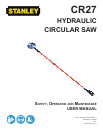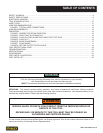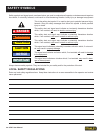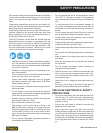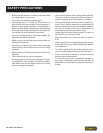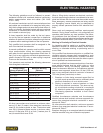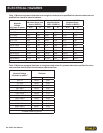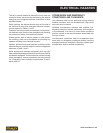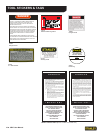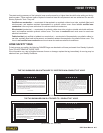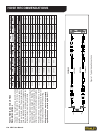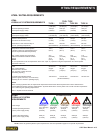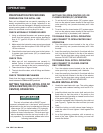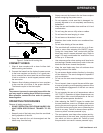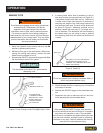
CR27 User Manual ◄ 5
SAFETY PRECAUTIONS
Tool operators and maintenance personnel must always
comply with the safety precautions given in this manual
and on the stickers and tags attached to the tool and
hose.
These safety precautions are given for your safety. Re-
view them carefully before operating the tool and before
performing general maintenance or repairs.
Supervising personnel should develop additional pre-
cautions relating to the specic work area and local
safety regulations. If so, place the added precautions in
the space provided in this manual.
The CR27 Hydraulic Circular Saw will provide safe and
dependable service if operated in accordance with the
instructions given in this manual. Read and understand
this manual and any stickers and tags attached to the
tool and hoses before operation. Failure to do so could
result in personal injury or equipment damage.
• Operator must start in a work area without bystand-
ers. The operator must be familiar with all prohibited
work areas such as excessive slopes and danger-
ous terrain conditions.
• Establish a training program for all operators to en-
sure safe operation.
• Do not operate the tool unless thoroughly trained or
under the supervision of an instructor.
• Always wear safety equipment such as goggles,
ear, head protection, and safety shoes at all times
when operating the tool.
• Do not overreach. Maintain proper footing and bal-
ance at all times.
• Do not inspect or clean the tool while the hydraulic
power source is connected. Accidental engagement
of the tool can cause serious injury.
• Supply hoses must have a minimum working pres-
sure rating of 2500 psi/175 bar.
• Be sure all hose connections are tight.
• The hydraulic circuit control valve must be in the
OFF position when coupling or uncoupling the tool.
Wipe all couplers clean before connecting. Use only
lint-free cloths. Failure to do so may result in dam-
age to the quick couplers and cause overheating of
the hydraulic system.
• Do not operate a damaged, improperly adjusted, or
incompletely assembled tool.
• Do not operate the tool at oil temperatures above
140 °F/60 °C. Operation at higher oil temperatures
can cause operator discomfort and may damage the
tool.
• To avoid personal injury or equipment damage, all
tool repair, maintenance and service must only be
performed by authorized and properly trained per-
sonnel.
• Do not exceed the rated limits of the tool or use the
tool for applications beyond its design capacity.
• Always keep critical tool markings, such as labels
and warning stickers legible.
• Always replace parts with replacement parts recom-
mended by Stanley Hydraulic Tools.
• Check fastener tightness often and before each use
daily.
• Do not wear loose tting clothing when operating the
tool.
• Keep all parts of your body away from the rotating
saw blade.
• Keep the saw blade off all surfaces when starting
the circle saw.
• Do not reverse saw blade rotation direction by
changing uid ow direction.
• Without the use of non-conductive accessories, this
tool is not for use near energized electric lines. Fail-
ure to comply with this warning could result in seri-
ous personal injury.
• Never cock, jam or wedge the saw blade during op-
eration.
• Eye injury and cutting or severing of body parts is
possible if proper procedures are not followed.
CIRCULAR SAW SPECIFIC SAFETY
PRECAUTIONS
• Do not rely exclusively upon the safety devices built
into the saw. As a circle saw user, several steps
must be taken to keep your cutting jobs free from
accident or injury.
• Ensure the saw blade is correctly mounted and
tightened before each use.
• Keep a good rm grip on the pole saw with both
hands. Place your right hand on the rear handle and
your left hand on the outer tube assembly when op-
erating. Use a rm grip with your thumbs and ngers
encircling the saw handle and outer tube assembly.
A rm grip helps keep control of the saw. Do not let
go.



